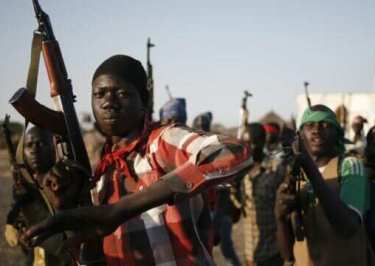S. Sudan army uncovers rebel plan for major military offensive
August 22, 2014 (JUBA) – The South Sudanese army (SPLA) says it has discovered a master plan drawn up by rebel forces outlining arrangements for mass mobilisation with the aim of launching a major offensive despite the signing of a ceasefire agreement.

Awan reportedly told Kiir that Machar and his group had drawn up plans for a complete military operation as early as June after the president drew a red line, saying he would neither accept to step down from his position as head of state nor entertain any proposal seeking dissolution of elected institutions, including legislative assemblies at any level.
During his briefing to the president, Awan said rebel forces were continuing to carry out “belligerent acts” and human rights violations despite a ceasefire deal brokered by IGAD in January and mounting international pressure to resolve the crisis.
“The recent attacks in Bentiu, Ayod, Renk, Nasir and other places, where our forces continue to show restraint in respect of the orders you gave them as the commander-in-chief, is the beginning of the major offensive,” Awan explained during his briefing to Kiir.
“Actually they started implementing their master plan early as June, but we foiled it. Now they are determined to roll it out during [the] rainy season because they know some of our tanks cannot move,” he added.
Awan told the president that the rebels have divided the country into areas of operation and have already assigned areas of responsibility.
He claimed Peter Gatdet had been assigned as overall commander for Unity state and parts of Warrap, while General Dau Aturjong, who has so far managed to mobilise former deserters from SPLA forces in Upper Nile, will take command of forces in North and Western Bahr El Gazal.
The strategy is allegedly intended to deny government forces of an opportunity of obtaining reinforcements from the Greater Bahr el Ghazal region in the event that there are similar military engagements.
Gatdet has so far managed to mobilise thousands of regular forces, backed by thousands of local youth from his Bul clan, one of the largest sections in Unity state.
Meanwhile, Aturjong has mobilised also thousands of fighters, some of whom reportedly belong to a South Sudanese youth group who joined him from Sudan.
Its members are believed to be among Greater Bahr el Ghazal communities who were unable to return to their ancestral homes after the South gained independence in 2011 due to a lack of transport options or who had returned to Sudan in search of employment opportunities.
Other operations will also be launched from Luo Nuer areas around Ayod with the aim of taking Jonglei capital Bor and continuing on to Juba.
It’s understood these operations will be spearheaded by Maj. Gen. Gatwech Dual, who will be backed by elements of the White Army mobilised from Lou Nuer and Gawar Nuer, while Maj. Gen. Gatwech Chan, also known as Gabriel Tanginye, will lead forces in Malakal and Renk and Maj. Gen. Gat-Hoth Gatkuoth will be tasked with seizing Nasir and the Paloch oil field.
Government forces and pro-Machar rebels have been engaged in an armed struggle since mid-December last year after a political dispute in South Sudan’s ruling party (SPLM) turned violent.
The fighting has killed thousands and displaced more than a million people, leading to fears of a worsening humanitarian catastrophe.
IGAD-led peace talks have continued to stall amid ongoing disagreements between the country’s warring parties.
(ST)
